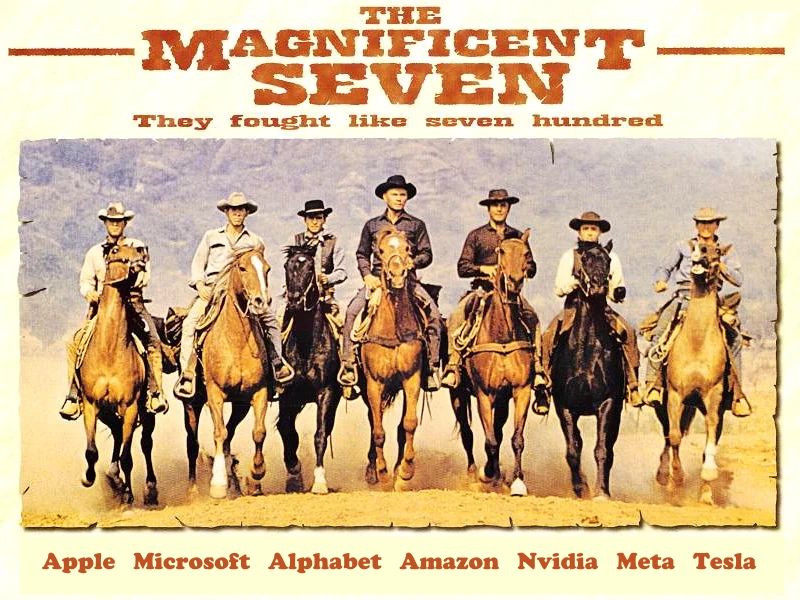The Magnificent 
The "Mag 7," short for the "Magnificent Seven," refers to a group of seven influential tech companies that have dominated U.S. stocks in recent years. These are the seven largest and most influential technology-driven companies on the U.S. stock market, known for their massive market capitalizations, dominant industry positions, and significant contributions to major indices like the S&P 500 and especially the NASDAQ.
The term was coined to highlight their market dominance and technological innovation, particularly in areas like AI, cloud computing, and digital services. How dominant are they? If you would have invested $1,000 in Nvidia stock on US Tax Day (April 15) in 2005, you would now own a stock worth a million or more.
"Magnificent Seven" was originally a reference to a 1960 Western film, "The Magnificent Seven," which was directed by John Sturges and depicts a group of seven gunmen. Bank of America analyst Michael Hartnett coined the phrase in 2023 when commenting on the seven companies commonly recognized for their market dominance, their technological impact, their changes to consumer behavior, and their influence on economic trends.

Most Mag7 companies started as collaborative ventures, indicative of the team culture inherent in technology. For Google, it was Page and Brin; Apple, Jobs and Wozniak; Facebook, Mark Zuckerberg along with Eduardo Saverin, Andrew McCollum, Dustin Moskovitz, and Chris Hughes; Microsoft, Gates and Allen; Nvidia, Jensen Huang, Chris Malachowsky, and Curtis Priem; and Tesla, Martin Eberhard and Marc Tarpenning, later acquired by Elon Musk. The lone exception is Amazon, founded by Jeff Bezos, initially financed by his family.
The Mag 7 companies have distinct AI strategies shaped by their core businesses. Here is a comparison of their strategies, strengths, and weaknesses. Select a company for more information.
|
|
Alphabet Google Search, YouTube, Android, Cloud, AI (DeepMind, Gemini) Market Cap: ~$4.0 trillion Strategy is AI-First with the Gemini Ecosystem. Their strengths are world-leading AI research and a massive data advantage with search, YouTube, and Android, and their weakness is they struggle with commercializing AI when compared to Microsoft. |
|
|
Amazon E-commerce, AWS cloud, Prime, AI (Alexa, Bedrock) Market Cap: ~$2.5 trillion Strategy is Practical AI with eCommerce and Amazon Web Services (AWS). Their strengths are real-world AI applications and profits from AWS and e-commerce, and their weakness is they lag in consumer-facing generative AI when compared to ChatGPT and Gemini. |
|
|
Apple iPhones, Macs, Services, Wearables Market Cap: ~$3.8 trillion Strategy is On-Device AI and Data Privacy. Their strengths are the privacy-first approach and seamless hardware-software integration, and their weakness is they were late to generative AI and are now playing catch-up with Apple Intelligence. |
|
|
Meta Facebook, Instagram, WhatsApp, Metaverse, AI (Llama) Market Cap: ~$1.6 trillion Strategy is Open-Source AI and the Metaverse Their strengths are open-source dominance and unmatched social data for training, and their weakness is they have no clear enterprise monetization as compared to Microsoft and Amazon. |
|
|
Microsoft Azure cloud, Windows, Office, AI (OpenAI partnership) Market Cap: ~$3.4 trillion Strategy is Enterprise AI and the OpenAI Partnership. Their strengths are a dominanamce in B2B AI and leveraging OpenAI's models while monetizing with Azure, and their weakness is a heavy reliance on OpenAI that poses regulatory risks. |
|
|
NVIDIA AI chips (GPUs), data centers, robotics, autonomous vehicles Market Cap: ~$4.5 trillion Strategy is AI Infrastructure, mostly hardware with some software. Their strength is a near-monopoly on AI chips that are essential to every other Mag7 company's AI usage, and their weaknesses are being dependent on current AI investment levels and future competitors. |
|
|
Tesla AI (Self-Driving Vehicles), energy storage, robotics (Optimus) Market Cap: ~$1.5 trillion Strategy is Real-World AI featuring Self-Driving and Robotics. Their strengths are real-time AI and massive real-world driving data, and their weaknesses are regulatory risks from autonomous driving and protracted lead time for robotics. |
Market Capitialization as of 16 January 2026.